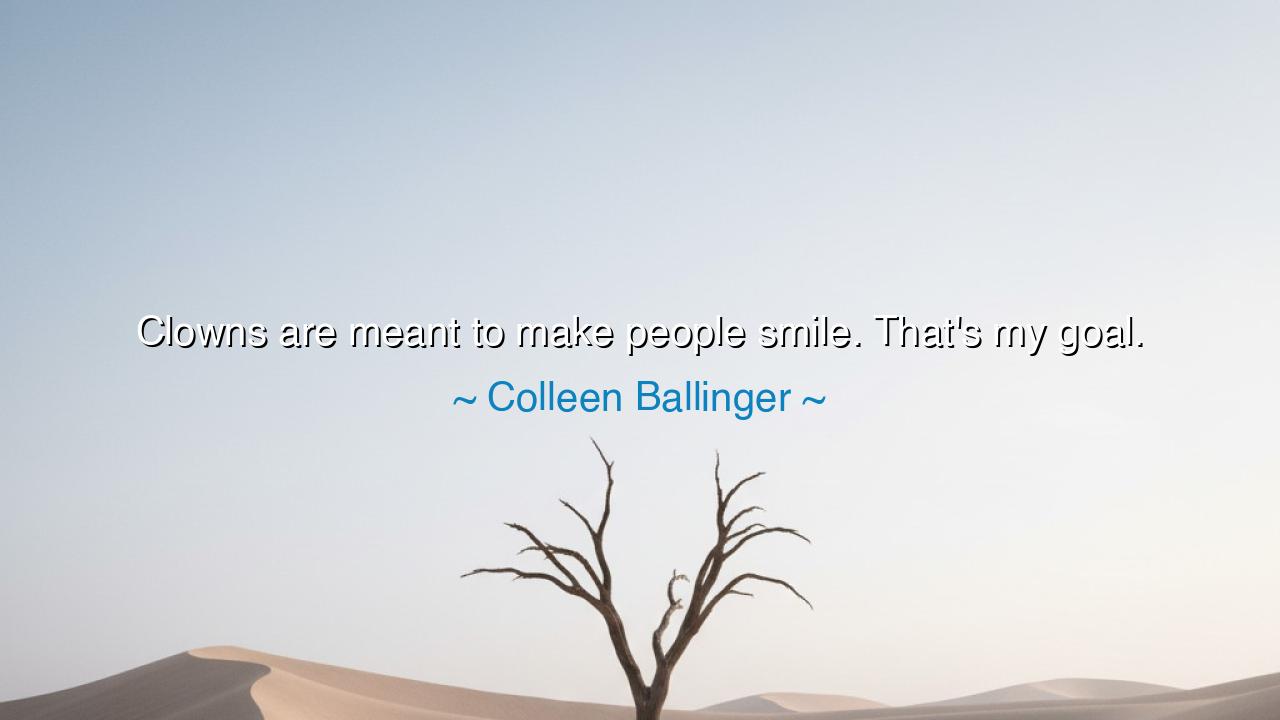
Clowns are meant to make people smile. That's my goal.






Hear the words of Colleen Ballinger, performer and bringer of laughter, who declared: “Clowns are meant to make people smile. That’s my goal.” Though simple in tone, this truth resounds with ancient depth. For the role of the clown is no small thing—it is the sacred task of carrying joy into the hearts of the weary, of painting light upon the canvas of human sorrow. In her words, Ballinger reminds us that the work of making others smile is not frivolous, but noble, even heroic.
The origin of the clown stretches back into antiquity. In the courts of kings stood the jester, whose foolishness concealed wisdom. In the villages of old roamed the trickster, who by antics and laughter revealed the vanity of power and the folly of pride. And long before, in the marketplaces of Greece, comic actors stirred laughter that balanced the tragedies of life. In every age, the clown was more than a fool—he was a healer of spirits, one who dared to lift the burdens of others by carrying the mask of mirth. Ballinger stands in this lineage, declaring that her goal is not self-glory, but the raising of others’ hearts.
The ancients understood the weight of such a calling. Consider the philosopher Democritus, called “the laughing philosopher,” who laughed not out of mockery, but out of deep wisdom—that man’s troubles, when seen in their true proportion, could be lightened by a change of spirit. Or recall the story of the French mime Deburau in the 19th century, whose silent portrayals brought comfort to multitudes. These figures embody the same truth: that to make others smile is to wield a subtle but mighty form of power—the power to renew the soul.
And yet, let us not be deceived—those who wear the face of the clown often carry hidden burdens. Many a performer has borne sorrow behind the mask, offering laughter while their own heart aches. This makes their gift all the more heroic: they set aside their wounds for a time, that others might be healed. In this we see the true nobility of the calling. Ballinger’s words, then, are not merely about humor, but about sacrifice: to make the smile of others your goal, even when your own smile must be forged from struggle.
This teaching is powerful for all, not just for clowns or comedians. Each of us, in our daily paths, has the chance to bring joy, to lift a heavy spirit, to awaken laughter in the face of trial. A kind word, a gentle jest, a patient heart—these are the acts of everyday clowns, sacred fools who remind the world not to drown in despair. For when we make others smile, we join in the most ancient of labors: the battle against sorrow itself.
The lesson, then, is this: let your goal in life not be only the pursuit of wealth, achievement, or recognition. These fade. Instead, weave joy into the lives of others. Become a source of light in small ways. Seek out the faces that frown and give them reason, however small, to smile. For the legacy of joy is greater than monuments of stone—it lingers in memory, it carries through generations, it redeems the darkest of days.
Therefore, beloved, make this your practice: be not afraid to play the fool if it brings laughter; do not withhold kindness when it can lighten another’s burden. Wear your own form of the clown’s mask—not of deception, but of courage, the courage to put others before yourself. For in the end, to live with such a goal is to join in the eternal work of healing. And when your days are measured, let it be said of you, as Ballinger declared of herself: this one lived to make people smile.






AAdministratorAdministrator
Welcome, honored guests. Please leave a comment, we will respond soon